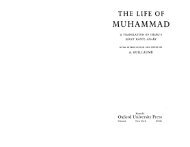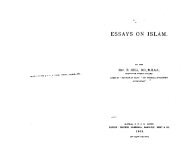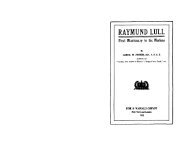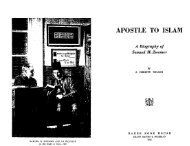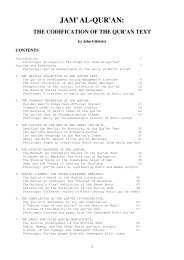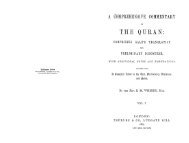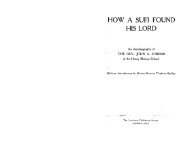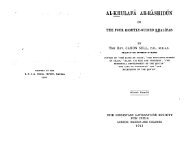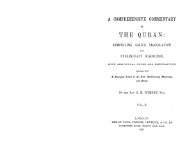Islam Its Belief and Practices - Radical Truth
Islam Its Belief and Practices - Radical Truth
Islam Its Belief and Practices - Radical Truth
Create successful ePaper yourself
Turn your PDF publications into a flip-book with our unique Google optimized e-Paper software.
130 ISLAM ITS BELIEFS AND PRACTICES SLAVERY AND PUNISHMENT 131<br />
iii.<br />
witnesses. he who thus brings a false charge<br />
receives eighty lashes (Sura 24: 4). If the<br />
accuser be a slave he receives forty stripes.<br />
This punishment was established by an<br />
alleged revelation from God. when Mu!}ammad's<br />
favourite wife, 'Ayisha, was accused<br />
of improper intimacy with ~afwan b.<br />
Mu'attal (See Sura 24).<br />
Apostasy (irtidad): A ma!e apostate is liable to<br />
be put to death if he continue obstinate in<br />
his error; a female apostate is not subject to<br />
capital punishment, but she may be kept in<br />
confinement until she recant.<br />
iv. Drunkenness (ash-Shurb): If a Muslim drink<br />
wine, <strong>and</strong> two witnesses testify to his having<br />
done so, or if his breath smell of wine, or if<br />
he shall himself confess to having taken wine<br />
or if he be found in a state of intoxication,<br />
he shall be beaten with eighty stipes.<br />
v. Theft (Sariqa): Sariqa literally means secretly<br />
taking away of another's property. <strong>Its</strong> legal<br />
definition in the Cannon Law is as follows:<br />
"It signifies taking away the property of<br />
another in a secret manner, at a time<br />
when such property is in custody,-that is,<br />
when the effects are in supposed security<br />
from the h<strong>and</strong>s of other people; <strong>and</strong> where<br />
the value is not less than ten dirhems, <strong>and</strong><br />
the effects taken the undoubted property of<br />
some other than of him who takes them."<br />
On the basis of this legal definition it is the<br />
decision of the Muslim jurists that, if the<br />
thieves make a hole in the wall, <strong>and</strong> one of<br />
them inside put objects through this hole<br />
into the h<strong>and</strong>s of others who are outside,<br />
this cannot be considered theft. Similarly<br />
nor can a man be punished for theft, if after<br />
having made a hole in the wall. he enters<br />
the room <strong>and</strong> places the objects he intends<br />
to take into the hole. then comes out <strong>and</strong><br />
carries them away.<br />
If a Muslim adult of sound underst<strong>and</strong>ing<br />
steals out of undoubted custody ten dirhems<br />
or property to the value of ten dirhems, his<br />
punishment is the cutting off of his h<strong>and</strong><br />
f Sura 5: 42). Amputation is not incurred by<br />
the theft of the following:<br />
(1) An amount stolen by a partyof thieves.<br />
which when distributed among them,<br />
each of them receives less than ten<br />
dirhems. (2) Anything of a trifling<br />
nature, such as wood, bamboos,<br />
grass, fish, fowls. <strong>and</strong> garden stuff.<br />
(3) Things which quickly decay<br />
<strong>and</strong> spoil, such as milk or fruit.<br />
(4) Fermentedliquor. (5) Guitaror<br />
tabor, these being of use merely<br />
as idle amusements. (6) A copy<br />
of the Qur'an. (7) A crucifix.<br />
(8) A chess board. (9) A free-born<br />
infant, although there be ornaments<br />
upon it, because a free person is<br />
not property. On the other h<strong>and</strong><br />
amputation is incurred by stealing<br />
an infant slave, although the<br />
stealing of an adult slave does<br />
not incur punishment. (10) A



